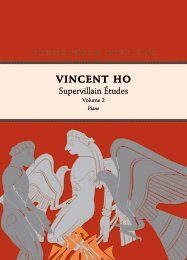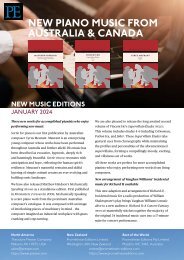De Angelis
by Christos Hatzis | Mezzo-Soprano, 3 Altos, Choir (SATB), and Drones
by Christos Hatzis | Mezzo-Soprano, 3 Altos, Choir (SATB), and Drones
- No tags were found...
Create successful ePaper yourself
Turn your PDF publications into a flip-book with our unique Google optimized e-Paper software.
sonally. Two of these in particular have inspired the music of <strong>De</strong> <strong>Angelis</strong>: (1)<br />
the feminine elements invested in Hildegard’s vision of the divine and of the<br />
centerpiece of the Christian Faith, the Holy Trinity, and (2) the concept of the<br />
ultimate redemption of Lucifer which is alluded to towards the end of ‘O<br />
gloriosissimi’. Even though clearly discernible in retrospect, the musical treatment<br />
of these two elements was not planned in advance. Like everything<br />
else about this composition, these elements formed into recognizable entities<br />
by themselves, and it was only after I had written a significant portion<br />
of <strong>De</strong> <strong>Angelis</strong> that I ‘saw’ them ‘staring’ at me through the pages of my own<br />
work. From that moment of understanding, the composition of <strong>De</strong> <strong>Angelis</strong><br />
turned into a kind of a theological discourse through sound.<br />
This type of discourse is of particular interest to me. I am adverse to textual<br />
creeds, because I feel that text by nature limits its subject matter and creates<br />
a dangerous substitution in the minds of the readers. For example, I wonder<br />
how many Christians today do not actually worship a ‘textual’ God, a god<br />
who comes to them through textual definitions provided by the Creed, the<br />
gospels, and the other sacred texts of each denomination. Moreover, I wonder<br />
to what extent this ‘textual’ God does not replace the ‘actual’ God in a<br />
worshiper’s mind, as the sacred texts become more ‘sacred’ in one’s religious<br />
practice. Music too is a language, but it is a language that has no fixed and<br />
mutually agreed upon vocabulary and syntax. In this sense music is particularly<br />
suited not only for metaphor but also for direct affect: it can convey<br />
great truths through sound without the need to define these truths and<br />
therefore limit them to the extent that spoken and written language do—<br />
with the possible exception of poetry, of course. Music can manifest truth<br />
either directly or through ‘transposition’,<br />
the same way parables and poetry can, whereas theology is<br />
trapped in textual semantics. As a result of this, it comes up against paradoxes<br />
similar to those reached by a variety of disciplines—scientific and/or<br />
otherwise—that depend on textual models of description to convey to the<br />
uninitiated the truths they claim to reveal.<br />
<strong>De</strong> <strong>Angelis</strong> started out as a work for mezzo-soprano, choir and<br />
multitrack digital tape playback that incorporated processed recordings<br />
of Hildegard’s antiphon and various drone-like sounds. For the better part<br />
of two months I kept encountering insurmountable—and, to some extent,<br />
inexplicable—problems with the technology, and experienced a writer’s<br />
block, which prevented me from embarking on the composition of the work<br />
beyond the level of ‘sketches’, none of which were particularly satisfactory.<br />
Finally, I decided to dispense with the electroacoustic component altogether<br />
and add three contraltos and drones (offstage voices, crystal glasses, etc.)<br />
which would replace the electronics. I also decided to place the contraltos<br />
at the back of the church to achieve spatial distribution of sound similar to<br />
what the multitrack diffusion system would have provided. From that moment<br />
on, <strong>De</strong> <strong>Angelis</strong> virtually ‘wrote itself’ at a speed which for me set a new<br />
record. It felt as if there was a desire independent from me for this work<br />
to go in a certain direction, and that the music would not flow out of me,

















